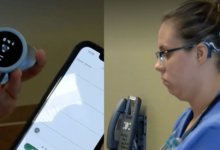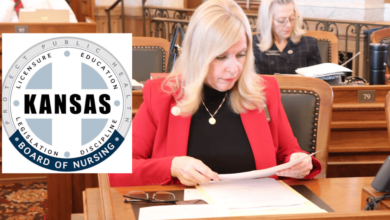‘Breadth’ of nursing roles showcased for International Nurses Day

A career in nursing “can take you almost anywhere”, senior nurses have said as they mark International Nurses Day 2024.
Two top nurses from Chelsea and Westminster Hospital NHS Foundation Trust have spoken to Nursing Times about why they love the profession and the opportunities it provides.
“I think it’s really about recognising nurses’ contribution to society, and really validating what nurses are doing”
Gabrielle Monk
Robert Bleasdale, executive chief nurse at the trust, said one of the most exciting aspects of nursing was the “breadth of roles” available.
With a background in urgent and emergency care and forensic health, Mr Bleasdale explained how his nursing career had taken him all around the country, from hospitals to police stations.
“We tend to think of nursing within either the community or a hospital,” he said.
“But actually, nursing takes roles within police, forensic health, mental health; I’ve got friends who have worked doing public health and working on cruise ships.
“Nursing can take you almost anywhere and gives you a lot of transferable skills.”
Mr Bleasdale has been in his current role for two years and before that he held various leadership roles at St George’s University Hospitals NHS Foundation Trust.
His last role at St George’s was chief nurse and director of infection prevention and control – a position he stepped into just as the Covid-19 pandemic was emerging, in 2020.

Robert Bleasdale
Reflecting, Mr Bleasdale said taking on these critical roles during a major health crisis was a “steep learning curve” but an experience that shaped him as a leader.
In addition, he said, for him, the pandemic “really demonstrated the power of nursing and midwifery and the safety critical role that we have”.
Now at Chelsea and Westminster, Mr Bleasdale said one of the strengths of the trust was innovation and that he wanted to support staff to continue to “push the boundaries”.
In particular, Mr Bleasdale advocated for nursing – as well as midwifery and the allied health professions (AHPs) – to expand their use of digital and have opportunities to progress into advanced clinical roles.
On the latter point, he said: “I absolutely support and champion the role of advanced clinical practice, but also new roles for nursing.
“Gone are the days where the [only] options were nurse management for career progression.
“Actually, working as an advanced practitioner, and working at the top of your license, is just as important and actually more important when you think about the workforce challenges of the future for the NHS.
“And certainly, within Chelsea, we’ve seen some real improvements in our patient pathways through using our advanced clinical practitioners.”
He cited an example of the trust making one of its urology pathways “nurse and advanced clinical practitioner led”, which meant the trust was able to speed up patient access to triage and diagnostic tests in an area where it was previously missing waiting time standards.
The trust has been holding various activities and celebrations throughout this week to mark International Nurses Day as well as International Day of the Midwife and National Operating Department Practitioner Day.

Staff at Chelsea and Westminster hold a healthcare showcase
This has included engagement with the local community and schools to promote a career in the NHS.
More than 100 staff from the trust will also be taking part in the Fulham Palace parkrun tomorrow alongside chief nursing officer for NHS London Jane Clegg.
Asked why he thought it was important to mark International Nurses Day, Mr Bleasdale said it was an opportunity to celebrate and thank the nursing workforce.
“You probably shouldn’t underestimate the importance of a thank you,” he added. “Because we ask a lot of our workforce on a day-to-day basis.”
More widely, Mr Bleasdale said it was a chance to promote nursing to the public and to put out a modern view of nursing into the world.
“Unless we showcase the breadth of roles within nursing and the value it brings both providing direct care, but also around addressing health inequalities, health inclusion, health promotion, people are going to hold a fixed view of nursing that perhaps may be dated, which won’t attract and retain nurses in the future,” he told Nursing Times.
“So, I think for me, it’s a real opportunity to showcase the breadth of nursing, say thank you, celebrate and look to the future around digital research, new roles, and then think around how do we use that as a platform to attract the new workforce and show those routes into nursing.”
He described the issue of attracting and retaining enough nurses into the workforce as one the biggest challenges facing the profession now and in the future.
These workforce challenges, and the fact there is an ageing population with increasingly complex health problems, meant health providers would need to think differently about the way they deliver care in the future, said the chief nurse.
“We’ve been very hospital centric or community centric and there has to be much more focus on integration and blended roles,” he added.
“I absolutely support and champion the role of advanced clinical practice, but also new roles for nursing”
Robert Bleasdale
“I see that as an opportunity really, for the way in which we provide health and the nursing role to drive that integration and new roles. But that doesn’t happen overnight. That will take some time.”
He said it would also be key in the future to meet the changing expectations of nurses who now want high levels of flexibility in their roles.
Meanwhile, Mr Bleasdale said the issue of “pay and reward of nursing and how we make that attractive” also needed to be addressed by government and trade unions.
One nurse at Chelsea and Westminster who has witnessed firsthand the expanding and evolving role of the nurse is Gabrielle Monk, nurse practitioner at 10 Hammersmith Broadway – the trust’s sexual health clinic.

Gabrielle Monk
Ms Monk has been a nurse since 1997, starting out in oncology before moving into sexual health and later health visiting, before returning to sexual health.
She has worked for the trust for around two decades and her current role is focused on outreach, working with external organisations like charities to take her service to groups such as sex workers, drug and alcohol users, people experiencing homelessness and young people.
The job is a brand new one that Ms Monk has been able to shape, which she said had come with its challenges but had also been extremely rewarding.
“I feel very, very lucky and very privileged to be in this position. It’s great job for a nurse,” she told Nursing Times.
Like Mr Bleasdale, Ms Monk said she saw International Nurses Day as an opportunity to shout about the diversity of the nursing role as well as celebrate the value of nursing to populations.
“I think it’s really about recognising nurses’ contribution to society, and really validating what nurses are doing. It is a phenomenal career choice, I personally think,” she said.
“And there are so many different aspects to nursing. It’s not all ward work… it encompasses so many things.”
In particular, Ms Monk wanted to encourage people to consider a career in sexual health nursing.
“Sexual health nursing is a phenomenal role for a nurse,” she said.
“It’s autonomous working, giving the best possible care to your patients, it’s evidence based.
“And I’m really fortunate to work in an area where our consultants are so behind their nursing team. We really feel valued.”
Asked about how the role of nursing had changed over her career, Ms Monk said, when she first started working in sexual health, nurses were like “chaperones, we basically were passing doctors swabs”.
Her role, at that time, was an asymptomatic nurse screener. This involved conducting sexual health screenings on patients with no symptoms of a disease – a job that is now able to be performed by healthcare assistants.
She recalled one day being amazed by an “incredible advanced nurse practitioner” who came into their clinic.
“She could do way more than we could. Yes, we could do examinations and things but she was also doing something called bimanual – so assessing for [pelvic inflammatory disease] and prescribing; and we were like, ‘Who is this? This is just amazing!’”
Now, Ms Monk is an independent prescriber herself.
And in general, she said nurses were “seeing way more complex patients, way more things that traditionally were seen by doctors”.
“It’s come a long way and it’s great,” she said.
One call to action that Ms Monk had was for tuition fees to be dropped for student nurses in England – a move that she thinks would help address workforce challenges in the profession.
“It’s a real vocation doing nursing. It doesn’t pay the best, right? You could get a degree in, I don’t know, accounting, and get paid a lot more but I think the job satisfaction would be much greater doing nursing, personally,” she said.
“I think if they could take away the fact that nursing students have to pay for their course, that would be truly spectacular. I think that would open things up a lot more.”
International Nurses Day is held annually on 12 May to coincide with the anniversary of Florence Nightingale’s birth.
The event is provided with a theme each year by the International Council of Nurses and for 2024 it is ‘Our Nurses. Our Future. The economic power of care’.
More on International Nurses Day 2024







